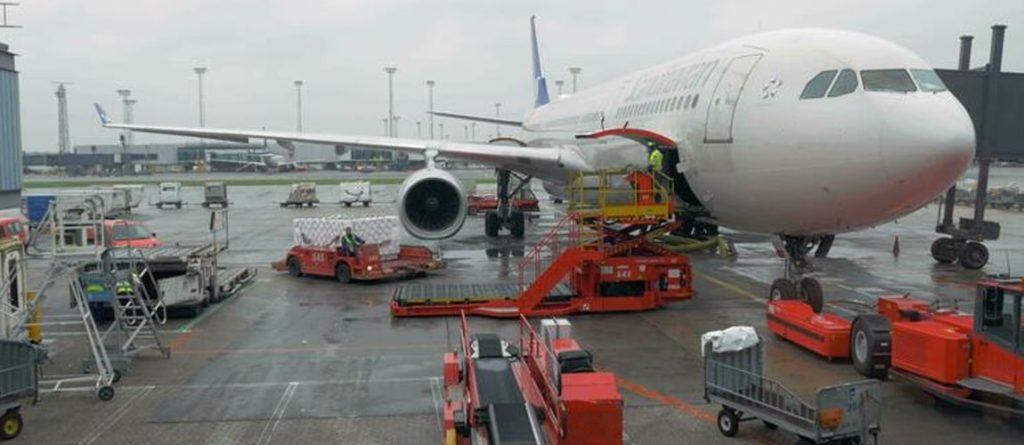
Introduction
In the ever-evolving landscape of global trade, efficiency is the name of the game. Industries across the world are constantly seeking ways to streamline their export processes and ensure that their goods reach international markets swiftly and securely. One key player in achieving this efficiency is air cargo. In this blog, we will explore how air cargo proves to be a vital and efficient component in the world of industrial exports, emphasizing its role in expediting deliveries, reducing costs, and enabling seamless international trade.
The Global Air Cargo Industry

The air cargo industry has experienced remarkable growth in recent decades, and its significance in the world of exports cannot be overstated. As industries have expanded their reach beyond borders, the need for a reliable and rapid transportation system has become paramount. This is where air cargo comes into play, facilitating the global movement of goods with remarkable speed.
Speed: The Air Cargo Advantage
When it comes to industrial exports, time is often of the essence. Air cargo provides the fastest means of transportation available. Whether you are exporting high-value electronics, perishable goods, or urgent medical supplies, air cargo ensures that your products reach their destination in the shortest time possible. This speed is a game-changer in industries where time-sensitive shipments are the norm.
Cost-Efficiency: Balancing Speed and Expense
While air cargo is known for its speed, it is important to note that it can also be a cost-effective option, depending on the specific needs of your export operation. Despite the initial perception of airfreight being more expensive than other modes of transportation, it can lead to significant cost savings in the long run. Reduced lead times can minimize inventory carrying costs and enhance supply chain management.
Reliability: Ensuring Timely Deliveries
One of the critical factors that contribute to the efficiency of air cargo in industrial exports is its reliability. Unlike ocean freight, which can be susceptible to delays caused by adverse weather conditions, port congestion, or labor strikes, air cargo flights operate on tight schedules. This reliability ensures that your shipments are less likely to encounter unexpected delays, enabling you to meet customer demands with greater confidence.
Customs Clearance: Simplifying International Trade
Navigating the complex world of customs regulations and documentation is a significant challenge in international trade. Air cargo often simplifies this process. Due to the streamlined nature of air transport, customs clearance procedures are generally faster and more straightforward. This helps industries avoid unnecessary bottlenecks in the export process.
Environmental Considerations: A Balancing Act
Efficiency in industrial exports is not solely about speed and cost; it also involves environmental responsibility. Air cargo, while incredibly efficient in terms of delivery speed, does have a larger carbon footprint compared to other modes of transportation like sea or rail. Industries must strike a balance between their need for rapid deliveries and their commitment to sustainable practices. This might include exploring carbon offset programs or optimizing cargo capacity to reduce emissions per unit of cargo.
Technology: The Digital Transformation
As with many aspects of modern life, technology has revolutionized the air cargo industry. The integration of digital platforms and tracking systems has made it easier than ever for industries to manage their shipments. Real-time tracking and data analytics enable businesses to monitor their cargo’s journey, anticipate potential issues, and make informed decisions to ensure efficiency.
Supply Chain Vulnerabilities
Recent global events, such as the COVID-19 pandemic and natural disasters, have exposed vulnerabilities in supply chains worldwide. Industries have realized the importance of building resilient supply chains that can adapt to unexpected disruptions. Air cargo plays a crucial role in this resilience, offering an agile transportation solution that can quickly respond to supply chain disruptions.
Diversification of Transportation Modes
To enhance supply chain resilience, industries are increasingly diversifying their transportation modes. While ocean freight remains a staple for large-volume shipments, air cargo provides a vital alternative for time-sensitive exports. By incorporating air cargo into their supply chain strategies, industries can reduce their reliance on a single mode of transportation and minimize the
The Future of Air Cargo: Innovations and Opportunities
Technology: The Digital Transformation
As with many aspects of modern life, technology has revolutionized the air cargo industry. The integration of digital platforms and tracking systems has made it easier than ever for industries to manage their shipments. Real-time tracking and data analytics enable businesses to monitor their cargo’s journey, anticipate potential issues, and make informed decisions to ensure efficiency.
Drone Technology: The Sky’s the Limit
In recent years, the aviation industry has been abuzz with the potential of drone technology in air cargo operations. Drones can access remote and challenging terrain, making them ideal for delivering medical supplies to remote areas or conducting urgent deliveries in emergency situations. The use of drones in air cargo has the potential to further enhance the efficiency and reach of industrial exports.
Supply Chain Vulnerabilities
Recent global events, such as the COVID-19 pandemic and natural disasters, have exposed vulnerabilities in supply chains worldwide. Industries have realized the importance of building resilient supply chains that can adapt to unexpected disruptions. Air cargo plays a crucial role in this resilience, offering an agile transportation solution that can quickly respond to supply chain disruptions
In the ever-changing landscape of industrial exports, efficiency is the key to success. Air cargo, with its unparalleled speed, reliability, and adaptability, has emerged as a game-changer in the world of global trade. While it may not be the ideal choice for all types of shipments, its role in facilitating time-sensitive deliveries and enhancing supply chain resilience cannot be ignored. As industries continue to evolve, air cargo will remain an essential tool for businesses seeking to thrive in the global marketplace.
In conclusion, air cargo is not merely a buzzword in the world of industrial exports; it is a driving force that propels businesses toward success. Its speed, cost-efficiency, reliability, and role in supply chain resilience make it an indispensable component of modern international trade. Industries that harness the power of air cargo will undoubtedly find themselves at the forefront of the global marketplace, delivering their goods efficiently and effectively to customers around the world.

 07424380227
07424380227